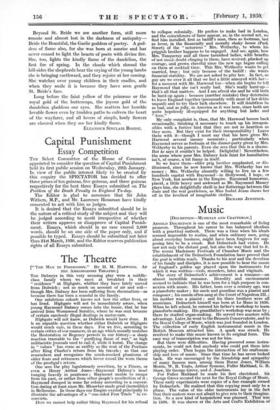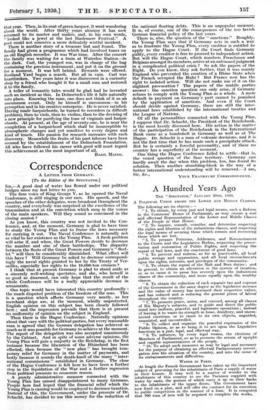Music
[DOLMETSCU—MUSICL&N AND CRAFTSMAN.]
ARNOLD DOLMETSCH is one of the most remarkable of living pioneers. Throughout his career he has balanced idealism with a practical outlook. There was a time when his ideals seemed impossible to realize, and when ordinary men, going about everyday business, might have been. forgiven for sup- posing him to be a crank. But Dolmetsch had vision. He saw not only the distant goal, but also the way that led to it. The recent Haslemere Festivals of Chamber Music and the establishment of the Dolmetsch Foundation have proved that the goal is within reach. Thanks to his zeal and the devotion of his family and disciples, it is now possible to hear the music of England's golden age played upon the instruments for which it was written—viols, recorders, lutes and virginals.
The story of Dolmetseh's achievement is a romance—an almost incredible romance. Heredity and environment seemed to indicate that he was born for a high purpose in con- nexion with music. His father, born over a century ago, was a pianoforte maker ; his uncle and guardian was a pianist and composer ; his cousin often sang at the Court of Napoleon III. ; his mother was a pianist ; and his three brothers _were all musicians. Dohnetsch himself was born at Le Mans in 1858. When he left school, he entered his father's workshop to learn pianoforte-making. His grandfather's workshop was near by ; there he studied organ-making. He served two masters. with advantage. Later, he went to the Brussels Conservatoire, and to the Royal College of Music, which was just founded in London. The collection of early English instrumental music in the British Museum attracted him. .A spark was struck. He resolved to make this music known in its original form. The easy way of transcription was not for him. Bit there were difficulties. Having procured some instru- ments, he could not find anybody who could put them into playing' Order. Then began the interaction of his craftsman- ship and love of music. Since that time he has never looked back. He was encouraged by the friendship and sympathy of many famous men, among them Burne Jones, William Morris, W. B. Yeats, Arthur Symons, Fuller Maitland, G. B. Shaw, Sir George Grove, and J. Joachim.
For Fuller Maitland he made his first clavichord. Sir George Grove secured the next for the Royal College of Music. These early experiments were copies of a fine example owned by Dolmetsch. He realized that this copying must only be a phase. The value of the older instruments lay in the fact that their makers were not afraid to give rein to their iinagina- tion. So a new kind of harpsichord was planned. That was in 1896. It was shown at the Arts and Crafts Exhibition of
that year. Then, in its coat of green lacquer, it went wandering about the world. After thirty years absence it has now returned to its master and Maker and, in his own words,
looked like a jewel at the last 'Haslemere Festival." A poet could not conceive a more delicately wistful incident.
There is another story of a treasure lost. and ,found. The family had given a programme which had involved tunes on an old English recorder. It was War time. After the concert the family was waiting for a train at Waterloo Station—in the • dark.. Carl, the youngest son, was in charge of the bag containing the precious instrument, and put it on the ground for a moment. It was left behind. Rewards were offered. Scotland Yard began a search. But all in vain. Carl was heartbroken. Two years later it was discovered in a curiosity shop by a friend who bought it for a small sum and restored
it to family.
A teller of romantic tales would be glad had he invented such an incident as this. In Dolmetsch's life it falls naturally into place. Knowing the man, one does not think of it as an uncommon event. Only he himself is uncommon—in his perception and in his creative enterprise. He is never satisfied. Having made harpsichords, he turned to recorders (a difficult problem), then to viols, then to violins, then to the devising of a new principle for purifying the tone of virginals and harpsi- chords. At present, at the age of seventy-one, he is near the completion of a harpsichord which shall be insusceptible to atmospheric changes and yet sensitive to every degree and kind of touch. His passion for research increases with each discovery. Meanwhile the fruits of his past labours have been secured by the establishment of the Dolmetsch Foundation. All, who have followed his career with good will must regard this achievement as the most important of all.
BASIL MAINE.







































 Previous page
Previous page